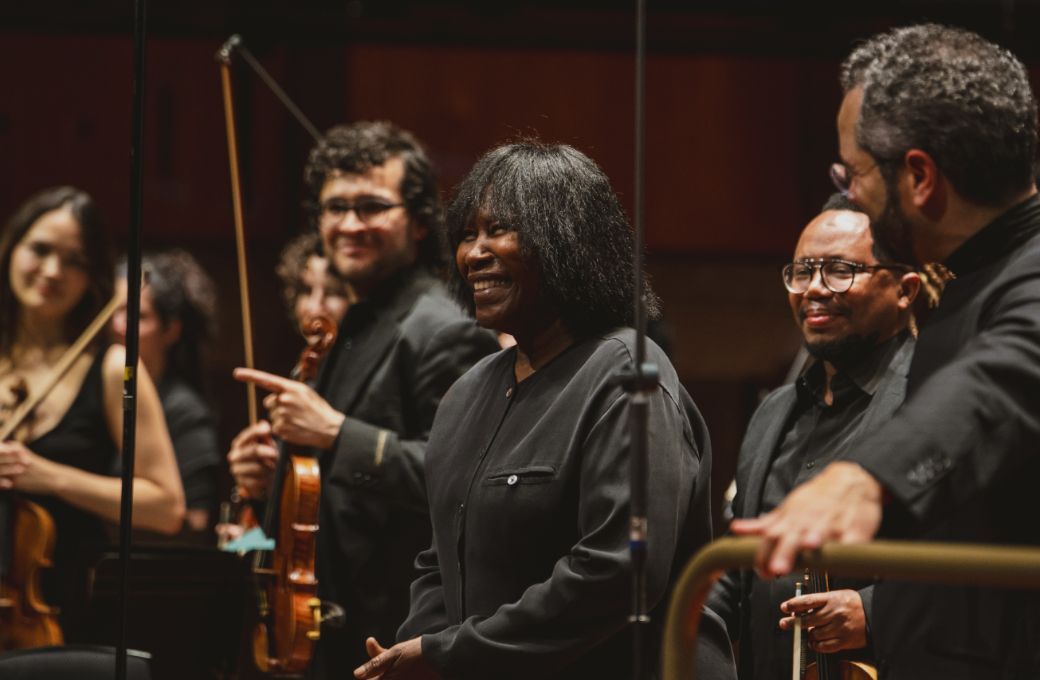You might think it’s quite easy defining what a symphony actually is, though composers over the ages have had very different ideas. Or you could align yourself with Humpty Dumpty in Alice, who was sure of one thing: “When I use a word, it means whatever I want it to mean, no more, no less.” When a composer like Joan Armatrading, previously known for her hit single Love and Affection and much more in a variety of musical genres, writes a symphony (and numbers it her first too, so more of the same may well follow), the head inevitably starts spinning with anticipation.

In this Chineke! concert conducted by Andrew Grams, Armatrading’s new work was receiving its world premiere. Lasting just under half an hour, and built on the conventional four movement pattern, simplicity appeared to be the watchword. No thematic development of the material but a mere continuum which moved, despite dynamic gradations, at the same basic pulse throughout; no great harmonic shifts; woodwinds that eschewed any aria-like contributions in favour of repetitive arabesques; nothing that marched towards any kind of obvious climax. Lots of unison string lines with occasional pizzicato effects, brass fanfares, staccato chords, cymbal crashes and even an electric piano. And yet... there was a buoyancy to the music, a sense of unbroken optimism untroubled by darker elements from below, a kind of en plein air freshness that harked back to the folksy naivety of Copland’s Appalachian Spring and which in its overriding positivity reminded me of the illuminated slogan standing outside the entrance to the concert hall: “We rise by lifting others”. The strongest impression was made by the Scherzo-like third movement, festive in character, conjuring up a small group of Hardanger fiddles processing along the shore of a Norwegian fjord.
Chineke! has recently appointed its first Assistant Conductor, and at the start of the evening Adam Gibbs conducted a rare outing for Duke Ellington's arrangement of the Overture from The Nutcracker, an opportunity for these players to cast some fairy-like glitter and sparkle over the proceedings.
The meat was most definitely in the second half. Chineke! consistently breaks traditional barriers and conventions so it would have been rewarding to hear an interpretation of one of Tchaikovsky’s earlier symphonies. As it happened, it was a stalwart of the repertory, his Symphony no. 5 in E minor. It was almost as if the earlier buoyancy in the Armatrading had carried through to this standard work, the orchestra playing with energy and commitment throughout, and responding well to Grams’ impassioned direction.
There were no histrionics or attention-seeking mannerisms, no sudden fluctuations in tempo and nothing that even hinted at the vulgarity that can give this composer a bad name. Instead, the performance moved from a hushed introduction to an Allegro con anima section pulsating with spirit and élan. Grams did not undersell the sheer potency of the music: there was vim and va-va-voom aplenty. Pierre Buizer’s poised and noble horn solo at the start of the slow movement ushered in a contemplative mood, though if anything there was little sense of the heartache that reminds the listener of Fate lurking in the background.
In his commentary on this symphony Donald Tovey refers to the nightmare in the Finale, “the Alice-and-Red-Queen-sensation of running faster and faster while remaining rooted to the spot”. The Chineke! strings were especially impressive here, digging deep, matched by the proud and confident statements of intent from the brass section. This was no Stoic resignation before the inevitable victory of Fate; this was a life-affirming assurance that the human spirit will always prevail.


